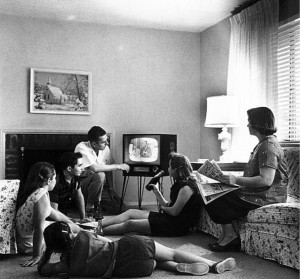 Film is to novel what television is to…?
Film is to novel what television is to…?
Okay, sorry for the bad SAT’s flashback. Your chances of getting into Harvard were ruined a long time ago (blame television or your parents, not me.) But seriously, I’ve been thinking a lot about this question.
The golden age of film has long been dead. Television has taken over as the true innovator of the visual story. We could all name our favorite examples of television shows over the last twenty years that have evolved the way we communicate, think and tell story. I won’t even start trying to make a list.
It has also been well established that film/movies often rely on novels as the basis of their story arcs. It is true that technically novels are difficult to crunch down into a few hours worth of movie, but feature films and novels both commonly endeavor to use the same sort of classic story arc–telling an entire story with a beginning, middle and end.
Sure, a television show must also have a sort of mini-arc with it’s own beginning, middle and end. These are often quite formulaic (CSI, Law and Order, X-Files, etc.) But television also has the larger seasonal and series arcs to play around with. Characters have several hours worth of opportunity to develop, change, grow, die and be born. Plots and subplots can appear, dive beneath the surface and reappear episodes later. Often times a television show can focus on a larger universe than a feature film.
Within the written word, what format of story-telling best matches the television format? And with the decline of film and rise of television will the novel step aside as well?
It’s possible that the rash of book series we have seen over the last decade has already answered this question. The series (of novels) is certainly more episodic than a stand alone novel. Thirty years ago, a series would have most likely been a trilogy, or basically a really long story built into three parts. Then something like the Star Wars universe would give rise to a whole slew of books within the broader universe written by lots of different authors.
But our modern novel series are still feature length stories written as sequels. Writing Rocky I, II, II and IV doesn’t seem like an answer to television, but to the sequel-ization of film.
Will the return of the written serial be today’s counterpart for television? Will eBooks be the final piece of the puzzle by removing all arbitrary significance given to book length? Will Amazon’s new serial store give an effective method of delivering the serial, thus propelling its rise to popularity (again)?
Both electronic reading and the post modern attention span seem well adapted for serial story-telling. But will our television-addled minds be open to reading at all? Or will story simply continue to shift away from written format all together?
I don’t think I have much as far as answers to these questions, but I’ve been attempting to find them by adapting my personal brand of story-telling. I have and will be attempting to fuse influences such as Lost, X-Files, Battlestar Galactica, Firefly, Smallville, Quantum Leap, Person of Interest, Castle and other television shows into my writing (content, format and technique). Hopefully, through asking these questions and experimentation, I’ll come up with some answers eventually.